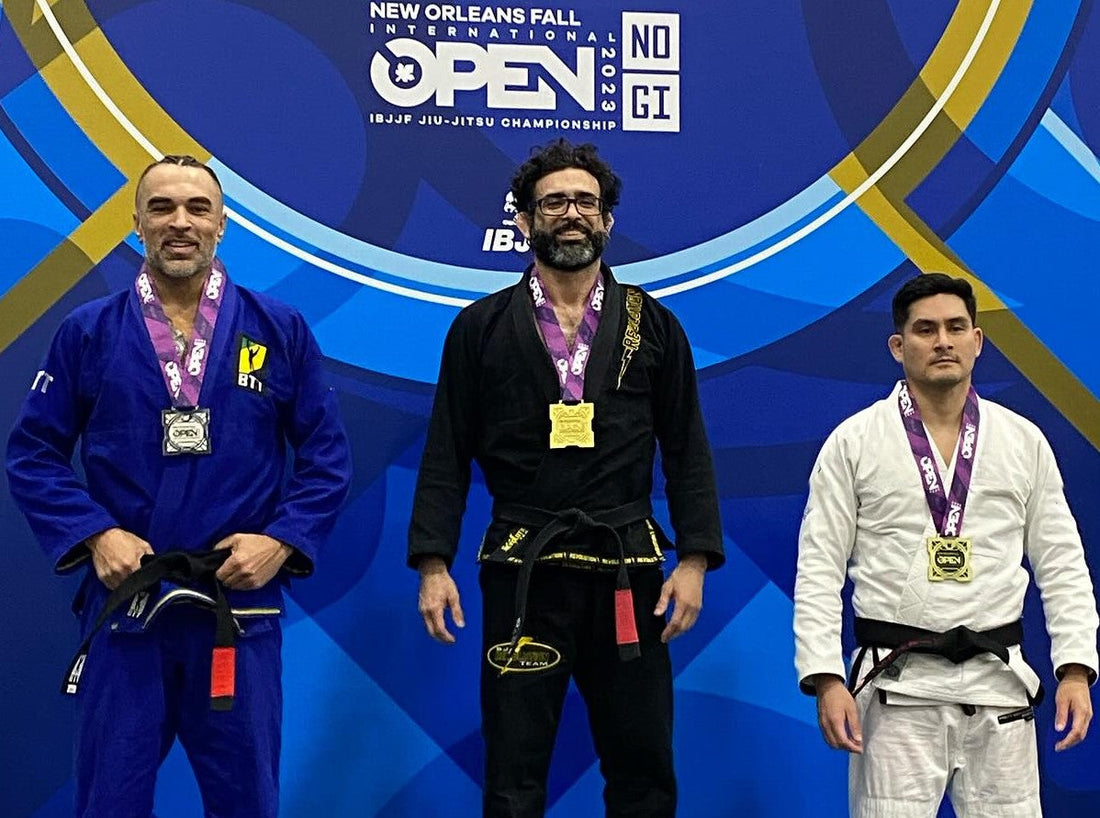
Meet Carlos Lazo "Mister Lazo" Black Belt
Share
January 2025 Midlife Roller Community Spotlight:
Carlos Lazo (44) - A Journey of Resilience and Awareness

At Midlife Rollers, our community thrives on stories of strength, perseverance, and the spirit of jiu-jitsu. This month, we’re proud to highlight Carlos Lazo (44), a dedicated member of our community whose journey embodies these qualities and more.
Carlos is a Social Studies teacher and the coach of his high school’s jiu-jitsu club. Beyond the classroom and mat, he is a seasoned Black Belt with 15 years of competitive jiu-jitsu experience under Revolution Dojo. Known for his passion and determination, Carlos has lived by the mantra: “Do the best I can until I can’t.” However, life recently presented him with an unexpected challenge that tested his resolve in unimaginable ways.
A Life-Changing Event
On Friday, July 26th, 2024, Carlos began experiencing symptoms of a stroke, a moment that would redefine his perspective on life and health. Over the years, unbeknownst to him, he had developed an occlusion (blockage) in the V4 segment of his vertebral artery, a critical artery in the brain. This blockage formed a clot that triggered what doctors diagnosed as a mild stroke. Carlos reflects on the experience with gratitude, acknowledging that seeking immediate medical attention likely prevented a more severe outcome.
The initial signs included tingling and numbness on his entire left side, accompanied by limited movement, balance issues, and impaired coordination. These symptoms marked the beginning of a challenging road to recovery.
The Journey to Recovery
Carlos spent eight days in Neuro Intensive Care, receiving treatment that included a Heparin drip to manage the clot. A CT angiogram conducted just before his discharge revealed that while the occlusion remained, it had not worsened—a positive sign in an otherwise daunting situation. The prognosis for recovery is a slow and steady journey of 3-6 months, heavily dependent on overall health and consistent care.
Today, Carlos is on medication and working diligently to regain his mobility and balance. While he’s moving better, he acknowledges that he’s not yet back to 100%. Despite the challenges, he’s committed to his recovery, bringing the same grit and discipline that he’s demonstrated on the mats to his new fight off of them.
Spreading Awareness
Carlos’ story serves as a reminder of the importance of listening to our bodies and taking proactive steps when something feels off. He shares his journey to raise awareness about the signs and risks of conditions like his.
Symptoms such as frequent migraines and dizziness can often go unnoticed or dismissed but may indicate more serious underlying health issues. By sharing his experience, Carlos hopes to encourage others to prioritize their health and seek medical attention when needed.
Q&A with Carlos Lazo
Q: How Long and Where have you been training?
A: I have been training for the past 15 years. I took a couple of breaks from jiujitsu to deal with life issues but for most of those I have been training at Revolution Dojo under Jeff Messina in Houston, TX.
Q: What made you start your Journey?
A: My brother Eric Lazo and I have always been active in many sports but the turning point was in 1995 when we watched Royce Gracie beat much bigger opponents. I think that this is a much often quoted story.
We didn’t join a jiujitsu gym until around 2009. Before that we were both in the Marines and had been introduced to wrestling and other martial arts through the Marine Martial arts program. My brother actually started jiujitsu before I did in 2005 and continued on until he met up with Greg Shaskan (rest in peace) of Carlson Gracie Chicago while my brother was studying for his nursing degree at UTMB-Galveston and Greg who was a brown belt had started a club there.
My brother joined and one thing led to another and my brother “opened” up a Carlson Gracie-Spaceland affiliate under Greg in a warehouse on our parent’s property. I was overweight at the time and I remember the call my brother made to me and asked me to join and he said “you’re fat, you’re depressed, and you’re going to die young if you keep going like that. Now, come do jiujitsu with me.”
I had always been a very active person growing up and had let myself go after Marines so this hit me hard. I started training and became obsessed like I do with so many things I do that are healthy for you. So, we trained 6x a week for one year straight before we made our move to Jeff Messina’s Revolution Dojo-Pinemont gym and have been with Revo ever since.
Q: How does Jiu Jitsu play a part in your recovery?
A: If you’re talking about regular recovery then it helps if you flow roll and do light movements to work that body loose. If you’re talking about my recent stroke three months ago and my current recovery, it helps with balance and coordination physically speaking.
As you might have heard me say a couple of times on my Instagram reels, for every minute you’re in a stroke over 1 million brain cells die. That means physically you are affected but also mentally and emotionally. Your balance is affected, your coordination is affected, your sleep cycles are affected, you name it, it’s affected.
Once I started moving more coordinated and with balance I started incorporating more movement in my garage on my dummy. Then I started doing one on ones at Katy with someone I trust very much with my recovery. Slowly but surely I started moving more and gradually developed more balance.
Doctors said I could do yoga and light movements so I had created my own system to help in my recovery and doing light flow drills. I’ve always been an advocate for flow drilling and flow rolling when you’re training pretty much everyday and it has helped wonders in my recovery thus far.
Cardiovascular exercises 45-60 minutes daily is good for stroke recovery. It used to be 5 minutes to 10 minutes etc a day. And Now I’ve built up. My balance is way better and I truly believe that jiujitsu movements, however limited, help with this. But another thing that really helps is the social part, the community, the teammates who have been an amazing support and help me keep coming back regardless of how shitty I feel that day.
Q: What keeps you on the mats?
A: Jiujitsu is a big puzzle. I have to be honest there was a part of me that became hopeless when I was in ICU. It’s like my world came crashing down on me and had to make a big shift from high level competitor to a casual hobbyist but then it dawned on me.
While this is considered a tragedy for many and can be traumatic, I always look at the bright side of things and thought to myself that maybe this was for a reason. Why am I alive? I asked myself. To be a better coach, to be a better instructor, to watch people grow and take what I teach them and be champions on and off the mats. To push forward and live up to what I said during my black belt promotion of “Never ever quitting!”
So, I took charge of my recovery and told myself that as a black belt in jiujitsu, it was not only my responsibility to teach and coach others but also to keep them safe from any harm. It is my calling, I believe, and that is why I’m still alive and why I keep going to the mats.
Q: What’s next for you?
A: Right now I’m in sort of a transitional period with my recovery. I am teaching and coaching a small private group at the high school I work for and preparing them for comps and have recently picked up a basics class to teach on Fridays at the Revolution Dojo-Katy location.
Teaching and coaching are my passion and I go with the flow. Right now as I recover my sights are set on continuing to teach and see where this takes. I think you already know just by reading this what I’m talking about. If all things point to yes and it’s good to go, I’ll make that decision when the time comes. My stroke and my recovery have taught me perseverance, patience, and optimism, so I’m sure with my experience and knowledge things will turn out the way we visualize.
Q: Any advice you want to give to others?
A: No matter what, it all comes down to mindset. Keep your mind busy and focused and tell yourself to never ever quit but be smart and you can achieve whatever it is you dream of.
Strength in Community
As Carlos navigates this new chapter, the support of his family, friends, and the jiu-jitsu community has been invaluable. His story is a testament to the resilience of the human spirit and the power of community in overcoming adversity.
At Midlife Rollers, we’re inspired by Carlos’ determination and courage. His journey reminds us that jiu-jitsu isn’t just a sport; it’s a way of life that prepares us to face challenges both on and off the mat. We’re proud to have Carlos as a part of our community and look forward to seeing him continue to inspire others with his story of perseverance.
Carlos has a Fundraiser setup if you're interested in assisting with his recovery. You can also reach out to Carlos with any questions or just to say hi on his
Instagram Account: mister_lazo_jiujitsu
